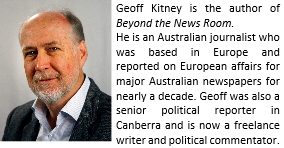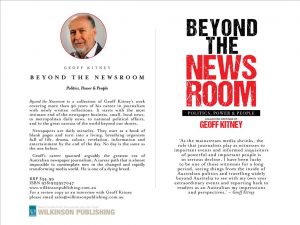The idea that the UK after Brexit could expect to get some sort of inside running for a beneficial trade agreement with the US needs a reality check. Boris Johnson would do well to heed the words of former Australian Prime Minister Malcolm Turnbull, writes Geoff Kitney.
In the United Kingdom’s post-Brexit view of the world, hard-headed realities are struggling to be recognised through a smokescreen created by political posturing and wishful thinking.
On the critical issue of Britain’s future trading relationships, for example, the Conservative government is talking reassuringly about a rosy economic future as a trading super power while adopting policies and political strategies that seem destined to stunt the UK’s long-term trade potential.
Just as the complicated issues in the Brexit debate were reduced to simple three-word slogans – Take Back Control and Get Brexit Done – the trade agenda, which is critical to the long-term fate of post-Brexit Britain, is being reduced to a game of goodies and baddies.
The baddies are, of course, the European Union. The goodies are the United States and the small club of Anglophone nations.
While Prime Minister Boris Johnson presented a typically jovial face in his on-line meeting with Ursula von der Leyen a few days ago, the formal negotiations with the EU have maintained the same rancorous state that existed in the Brexit negotiations.
In stark contrast, preparations for free trade agreement (FTA) negotiations with the US and countries like Australia, New Zealand and Canada are talked of in terms of old friends ready and willing to help Britain emerge prosperously from its entanglement with the EU.
Johnson wants obstacles to a Brexit deal removed by October, ruling out the UK seeking an extension in negotiations into next year – a tall order. This would, of course, be strongly in the UK’s immediate financial interests as it would be able to cease paying contributions to the EU budget.
Although, if it means the UK retreating on key issues related to the EU’s demand for a level playing field deal, Johnson will face an angry mob of Brexiters. They want nothing less than a declaration of economic warfare against the EU in which the UK undercuts as much EU regulation as possible to gain the competitive advantage needed to launch “global Britain” towards unprecedented prosperity.
In fact, behind Johnson’s “let’s get it done” exhortations to von der Leyen may well be the idea that the UK needs to get a Brexit deal done (or ditched) so it can energise the more important and more rewarding business of trade agreements with its old “Anglosphere” friends, with the US chief among them.
A Biden presidency would change the dynamics of FTA negotiations with the UK.
From the outset, the dreams of a global Britain carrying the torch for free trade have hinged on the US. When President Donald Trump joined the Brexit crowd and held out the promise of a “big and quick” free trade agreement between the US and the UK, Brexiters cheered, saying the UK would never need to look back with anything other than delight that the nation had had the good sense to vote to leave the EU.
But time may be shorter for securing a UK-US deal than a trade deal with the EU.
The re-election prospects for President Trump have slumped in the wake of the coronavirus and the Black Lives Matter furore. Democrat candidate Joe Biden is now believed to have a good chance of winning on November 3. A Biden presidency would change the dynamics of FTA negotiations with the UK.
Ironically, given Trump’s “America first” approach to dealing with the world, Biden would be likely to take a much tougher stand in advancing US interests in any trade negotiations. A top priority for Biden also would be to repair the relationship with Europe, which Trump has trashed. Biden would want to revitalise negotiations with the EU over a free trade partnership, a process that has become moribund under Donald Trump.
But, regardless of the outcome of the US presidential election, the idea that the UK could expect to get some sort of inside running for a beneficial trade agreement with the US needs a reality check.
In this, some advice from a former Australian prime minister might be useful.
‘It was a reminder that when it comes to trade, nations – particularly big ones – will ruthlessly pursue their own interests.’ Malcolm Turnbull
Malcolm Turnbull was PM during the crucial stages of negotiations for a Trans-Pacific Partnership trade agreement – a proposed free trade zone covering all the nations of the Pacific rim, including the US, Japan, Australia and nine other countries.
In A Bigger Picture, a recently published memoir of his years as prime minister (2015 to 2018), Turnbull recounts the brutal way the US sought to influence the negotiations to favour US business interests, particularly the giant US pharmaceutical companies.
Turnbull records that US Big Pharma had major issues with Australia’s Pharmaceutical Benefits Scheme in which the state uses its monopoly powers to buy drugs for lower prices for Australian citizens than would be paid in an open market. It’s similar to the way the UK buys drugs under the National Health Service.
At a critical point in the negotiations, then Democrat US President Barack Obama demanded that the TPP include provisions that protected the patents for biologics produced in the US – a demand which would have forced the PBS to pay higher prices. Australia refused to agree to the demand, putting the whole agreement in jeopardy.
Turnbull recounts how the US sought to escalate the issue to one of national security, warning Australia that if it refused to budge it would put the whole Australia-US strategic alliance at stake. “We were warned that the atmospherics with the Americans would likely be poisonous if the talks collapsed,” Turnbull said.
At one point, President Obama called Turnbull to tell him that the power of the Big Pharma corporations could not be ignored and that Australia would be blamed for the collapse of the TPP.
Australia refused to budge and in the end the US signed the deal – although President Trump withdrew the US within months of becoming president, in part because of the anger of Big Pharma.
Turnbull concluded in his book: “It was a reminder that when it comes to trade, nations – particularly big ones – will ruthlessly pursue their own interests.”
US trade deal ‘could pose greatest risk to UK food since BSE crisis’ https://t.co/mBzbtivUpO
— Chief-Exec.com (@Chief_Exec_com) June 22, 2020
Turnbull’s account of the role of big US corporate power in trade negotiations is a salutary real-life example of what former UK Ambassador to the US, Kim Darroch, warned of following his resignation from the post under pressure from Donald Trump.
Darroch said that the UK would face the power of big US corporations to produce a deal favourable to them, regardless of Donald Trump’s promises of a favourable deal for the UK.
“The US will put the interests of corporate America first,” Darroch said in an interview with The Guardian. This would include the drug companies and the big US agricultural corporations.
A key point about this is that Australia was able to resist US pressure because, while the TPP offered some economic benefits, it was of only marginal value to the Australian economy and Australia’s total trade.
For the UK, a US trade deal is of fundamental importance to its economic prospects after Brexit. The UK, particularly after the Covid-19 pandemic, is in a far weaker negotiating position than was Australia.
The economic and trade realities of life after Brexit will be very different to the vacuous rhetoric of the “take back control” Brexit crowd that conned the British public.
Headline image credit: Robert Fowler/Shutterstock.com






